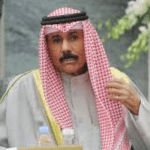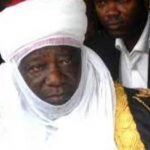Born in 1929, Sheikh Sabah is widely regarded as the architect of modern Kuwait’s foreign policy – having served as foreign minister for nearly 40 years between 1963 and 2003 – when he became prime minister.
He became Kuwait’s emir in January 2006 after the death of Sheikh Jaber al-Sabah.
In August 2019, Kuwait acknowledged Sheikh Sabah suffered an unspecified medical “setback” that required he be admitted to hospital.
In July 2020, he flew to the United States seeking medical attention after undergoing surgery.
A US Air Force C-17 flying hospital transported Sheikh Sabah from Kuwait to Rochester, Minnesota, home of the flagship campus of the Mayo Clinic.
The high regard for Sheikh Sabah could be seen in the outpouring of support for him across the Middle East as he suddenly fell ill.
Sheikh Sabah drew on his decades as the oil-rich nation’s top diplomat to push for closer ties to Iraq after the 1990 Gulf War and solutions to other regional crises.
His 2006 ascension in Kuwait, a staunch US ally since the American-led war that expelled occupying Iraqi troops, came after parliament voted unanimously to oust his predecessor, the ailing Sheikh Saad al-Abdullah al-Sabah, just nine days into his rule.
Yet as Kuwait’s ruling emir, he struggled with internal political disputes, the fallout of the 2011 Arab Spring protests, and seesawing crude oil prices that chewed into a national budget providing cradle-to-grave subsidies.
The emir had his appendix removed in 2002, two years after having a pacemaker fitted.
In 2007, he underwent urinary tract surgery in the United States.
When the emir was absent in the past, 83-year-old Crown Prince Nawaf al-Ahmad al-Sabah, the emir’s half-brother, was appointed acting ruler as per the country’s constitutional law.
Sheikh Nawaf is an elder statesman who has held high office for decades, including the defence and interior portfolios.
Sheikh Sabah had pushed for diplomacy to solve regional issues, such as the continuing boycott of Qatar by four Arab nations, and he hosted major donor conferences for war-torn nations such as Iraq and Syria.
Kuwait television earlier interrupted regular programming to cut to Quranic verses on Tuesday, a move that often signifies the death of a senior member of the Gulf Arab state’s ruling family.
His death comes as the nation continues to fight the coronavirus pandemic, which has infected more than 103,981 people and caused 605 related deaths in the country of 4.1 million.
Its health ministry said more than 95,500 people have recovered from COVID-19.
Born in 1929, Sheikh Sabah is widely regarded as the architect of modern Kuwait’s foreign policy – having served as foreign minister for nearly 40 years between 1963 and 2003 – when he became prime minister.
He became Kuwait’s emir in January 2006 after the death of Sheikh Jaber al-Sabah.
In August 2019, Kuwait acknowledged Sheikh Sabah suffered an unspecified medical “setback” that required he be admitted to hospital.
In July 2020, he flew to the United States seeking medical attention after undergoing surgery.
A US Air Force C-17 flying hospital transported Sheikh Sabah from Kuwait to Rochester, Minnesota, home of the flagship campus of the Mayo Clinic.
The high regard for Sheikh Sabah could be seen in the outpouring of support for him across the Middle East as he suddenly fell ill.
Sheikh Sabah drew on his decades as the oil-rich nation’s top diplomat to push for closer ties to Iraq after the 1990 Gulf War and solutions to other regional crises.
His 2006 ascension in Kuwait, a staunch US ally since the American-led war that expelled occupying Iraqi troops, came after parliament voted unanimously to oust his predecessor, the ailing Sheikh Saad al-Abdullah al-Sabah, just nine days into his rule.
Yet as Kuwait’s ruling emir, he struggled with internal political disputes, the fallout of the 2011 Arab Spring protests, and seesawing crude oil prices that chewed into a national budget providing cradle-to-grave subsidies.
The emir had his appendix removed in 2002, two years after having a pacemaker fitted.
In 2007, he underwent urinary tract surgery in the United States.
When the emir was absent in the past, 83-year-old Crown Prince Nawaf al-Ahmad al-Sabah, the emir’s half-brother, was appointed acting ruler as per the country’s constitutional law.
Sheikh Nawaf is an elder statesman who has held high office for decades, including the defence and interior portfolios.
Sheikh Sabah had pushed for diplomacy to solve regional issues, such as the continuing boycott of Qatar by four Arab nations, and he hosted major donor conferences for war-torn nations such as Iraq and Syria.
Kuwait television earlier interrupted regular programming to cut to Quranic verses on Tuesday, a move that often signifies the death of a senior member of the Gulf Arab state’s ruling family.
His death comes as the nation continues to fight the coronavirus pandemic, which has infected more than 103,981 people and caused 605 related deaths in the country of 4.1 million.
Its health ministry said more than 95,500 people have recovered from COVID-19.
Born in 1929, Sheikh Sabah is widely regarded as the architect of modern Kuwait’s foreign policy – having served as foreign minister for nearly 40 years between 1963 and 2003 – when he became prime minister.
He became Kuwait’s emir in January 2006 after the death of Sheikh Jaber al-Sabah.
In August 2019, Kuwait acknowledged Sheikh Sabah suffered an unspecified medical “setback” that required he be admitted to hospital.
In July 2020, he flew to the United States seeking medical attention after undergoing surgery.
A US Air Force C-17 flying hospital transported Sheikh Sabah from Kuwait to Rochester, Minnesota, home of the flagship campus of the Mayo Clinic.
The high regard for Sheikh Sabah could be seen in the outpouring of support for him across the Middle East as he suddenly fell ill.
Sheikh Sabah drew on his decades as the oil-rich nation’s top diplomat to push for closer ties to Iraq after the 1990 Gulf War and solutions to other regional crises.
His 2006 ascension in Kuwait, a staunch US ally since the American-led war that expelled occupying Iraqi troops, came after parliament voted unanimously to oust his predecessor, the ailing Sheikh Saad al-Abdullah al-Sabah, just nine days into his rule.
Yet as Kuwait’s ruling emir, he struggled with internal political disputes, the fallout of the 2011 Arab Spring protests, and seesawing crude oil prices that chewed into a national budget providing cradle-to-grave subsidies.
The emir had his appendix removed in 2002, two years after having a pacemaker fitted.
In 2007, he underwent urinary tract surgery in the United States.
When the emir was absent in the past, 83-year-old Crown Prince Nawaf al-Ahmad al-Sabah, the emir’s half-brother, was appointed acting ruler as per the country’s constitutional law.
Sheikh Nawaf is an elder statesman who has held high office for decades, including the defence and interior portfolios.
Sheikh Sabah had pushed for diplomacy to solve regional issues, such as the continuing boycott of Qatar by four Arab nations, and he hosted major donor conferences for war-torn nations such as Iraq and Syria.
Kuwait television earlier interrupted regular programming to cut to Quranic verses on Tuesday, a move that often signifies the death of a senior member of the Gulf Arab state’s ruling family.
His death comes as the nation continues to fight the coronavirus pandemic, which has infected more than 103,981 people and caused 605 related deaths in the country of 4.1 million.
Its health ministry said more than 95,500 people have recovered from COVID-19.
Born in 1929, Sheikh Sabah is widely regarded as the architect of modern Kuwait’s foreign policy – having served as foreign minister for nearly 40 years between 1963 and 2003 – when he became prime minister.
He became Kuwait’s emir in January 2006 after the death of Sheikh Jaber al-Sabah.
In August 2019, Kuwait acknowledged Sheikh Sabah suffered an unspecified medical “setback” that required he be admitted to hospital.
In July 2020, he flew to the United States seeking medical attention after undergoing surgery.
A US Air Force C-17 flying hospital transported Sheikh Sabah from Kuwait to Rochester, Minnesota, home of the flagship campus of the Mayo Clinic.
The high regard for Sheikh Sabah could be seen in the outpouring of support for him across the Middle East as he suddenly fell ill.
Sheikh Sabah drew on his decades as the oil-rich nation’s top diplomat to push for closer ties to Iraq after the 1990 Gulf War and solutions to other regional crises.
His 2006 ascension in Kuwait, a staunch US ally since the American-led war that expelled occupying Iraqi troops, came after parliament voted unanimously to oust his predecessor, the ailing Sheikh Saad al-Abdullah al-Sabah, just nine days into his rule.
Yet as Kuwait’s ruling emir, he struggled with internal political disputes, the fallout of the 2011 Arab Spring protests, and seesawing crude oil prices that chewed into a national budget providing cradle-to-grave subsidies.
The emir had his appendix removed in 2002, two years after having a pacemaker fitted.
In 2007, he underwent urinary tract surgery in the United States.
When the emir was absent in the past, 83-year-old Crown Prince Nawaf al-Ahmad al-Sabah, the emir’s half-brother, was appointed acting ruler as per the country’s constitutional law.
Sheikh Nawaf is an elder statesman who has held high office for decades, including the defence and interior portfolios.
Sheikh Sabah had pushed for diplomacy to solve regional issues, such as the continuing boycott of Qatar by four Arab nations, and he hosted major donor conferences for war-torn nations such as Iraq and Syria.
Kuwait television earlier interrupted regular programming to cut to Quranic verses on Tuesday, a move that often signifies the death of a senior member of the Gulf Arab state’s ruling family.
His death comes as the nation continues to fight the coronavirus pandemic, which has infected more than 103,981 people and caused 605 related deaths in the country of 4.1 million.
Its health ministry said more than 95,500 people have recovered from COVID-19.
Born in 1929, Sheikh Sabah is widely regarded as the architect of modern Kuwait’s foreign policy – having served as foreign minister for nearly 40 years between 1963 and 2003 – when he became prime minister.
He became Kuwait’s emir in January 2006 after the death of Sheikh Jaber al-Sabah.
In August 2019, Kuwait acknowledged Sheikh Sabah suffered an unspecified medical “setback” that required he be admitted to hospital.
In July 2020, he flew to the United States seeking medical attention after undergoing surgery.
A US Air Force C-17 flying hospital transported Sheikh Sabah from Kuwait to Rochester, Minnesota, home of the flagship campus of the Mayo Clinic.
The high regard for Sheikh Sabah could be seen in the outpouring of support for him across the Middle East as he suddenly fell ill.
Sheikh Sabah drew on his decades as the oil-rich nation’s top diplomat to push for closer ties to Iraq after the 1990 Gulf War and solutions to other regional crises.
His 2006 ascension in Kuwait, a staunch US ally since the American-led war that expelled occupying Iraqi troops, came after parliament voted unanimously to oust his predecessor, the ailing Sheikh Saad al-Abdullah al-Sabah, just nine days into his rule.
Yet as Kuwait’s ruling emir, he struggled with internal political disputes, the fallout of the 2011 Arab Spring protests, and seesawing crude oil prices that chewed into a national budget providing cradle-to-grave subsidies.
The emir had his appendix removed in 2002, two years after having a pacemaker fitted.
In 2007, he underwent urinary tract surgery in the United States.
When the emir was absent in the past, 83-year-old Crown Prince Nawaf al-Ahmad al-Sabah, the emir’s half-brother, was appointed acting ruler as per the country’s constitutional law.
Sheikh Nawaf is an elder statesman who has held high office for decades, including the defence and interior portfolios.
Sheikh Sabah had pushed for diplomacy to solve regional issues, such as the continuing boycott of Qatar by four Arab nations, and he hosted major donor conferences for war-torn nations such as Iraq and Syria.
Kuwait television earlier interrupted regular programming to cut to Quranic verses on Tuesday, a move that often signifies the death of a senior member of the Gulf Arab state’s ruling family.
His death comes as the nation continues to fight the coronavirus pandemic, which has infected more than 103,981 people and caused 605 related deaths in the country of 4.1 million.
Its health ministry said more than 95,500 people have recovered from COVID-19.
Born in 1929, Sheikh Sabah is widely regarded as the architect of modern Kuwait’s foreign policy – having served as foreign minister for nearly 40 years between 1963 and 2003 – when he became prime minister.
He became Kuwait’s emir in January 2006 after the death of Sheikh Jaber al-Sabah.
In August 2019, Kuwait acknowledged Sheikh Sabah suffered an unspecified medical “setback” that required he be admitted to hospital.
In July 2020, he flew to the United States seeking medical attention after undergoing surgery.
A US Air Force C-17 flying hospital transported Sheikh Sabah from Kuwait to Rochester, Minnesota, home of the flagship campus of the Mayo Clinic.
The high regard for Sheikh Sabah could be seen in the outpouring of support for him across the Middle East as he suddenly fell ill.
Sheikh Sabah drew on his decades as the oil-rich nation’s top diplomat to push for closer ties to Iraq after the 1990 Gulf War and solutions to other regional crises.
His 2006 ascension in Kuwait, a staunch US ally since the American-led war that expelled occupying Iraqi troops, came after parliament voted unanimously to oust his predecessor, the ailing Sheikh Saad al-Abdullah al-Sabah, just nine days into his rule.
Yet as Kuwait’s ruling emir, he struggled with internal political disputes, the fallout of the 2011 Arab Spring protests, and seesawing crude oil prices that chewed into a national budget providing cradle-to-grave subsidies.
The emir had his appendix removed in 2002, two years after having a pacemaker fitted.
In 2007, he underwent urinary tract surgery in the United States.
When the emir was absent in the past, 83-year-old Crown Prince Nawaf al-Ahmad al-Sabah, the emir’s half-brother, was appointed acting ruler as per the country’s constitutional law.
Sheikh Nawaf is an elder statesman who has held high office for decades, including the defence and interior portfolios.
Sheikh Sabah had pushed for diplomacy to solve regional issues, such as the continuing boycott of Qatar by four Arab nations, and he hosted major donor conferences for war-torn nations such as Iraq and Syria.
Kuwait television earlier interrupted regular programming to cut to Quranic verses on Tuesday, a move that often signifies the death of a senior member of the Gulf Arab state’s ruling family.
His death comes as the nation continues to fight the coronavirus pandemic, which has infected more than 103,981 people and caused 605 related deaths in the country of 4.1 million.
Its health ministry said more than 95,500 people have recovered from COVID-19.
Born in 1929, Sheikh Sabah is widely regarded as the architect of modern Kuwait’s foreign policy – having served as foreign minister for nearly 40 years between 1963 and 2003 – when he became prime minister.
He became Kuwait’s emir in January 2006 after the death of Sheikh Jaber al-Sabah.
In August 2019, Kuwait acknowledged Sheikh Sabah suffered an unspecified medical “setback” that required he be admitted to hospital.
In July 2020, he flew to the United States seeking medical attention after undergoing surgery.
A US Air Force C-17 flying hospital transported Sheikh Sabah from Kuwait to Rochester, Minnesota, home of the flagship campus of the Mayo Clinic.
The high regard for Sheikh Sabah could be seen in the outpouring of support for him across the Middle East as he suddenly fell ill.
Sheikh Sabah drew on his decades as the oil-rich nation’s top diplomat to push for closer ties to Iraq after the 1990 Gulf War and solutions to other regional crises.
His 2006 ascension in Kuwait, a staunch US ally since the American-led war that expelled occupying Iraqi troops, came after parliament voted unanimously to oust his predecessor, the ailing Sheikh Saad al-Abdullah al-Sabah, just nine days into his rule.
Yet as Kuwait’s ruling emir, he struggled with internal political disputes, the fallout of the 2011 Arab Spring protests, and seesawing crude oil prices that chewed into a national budget providing cradle-to-grave subsidies.
The emir had his appendix removed in 2002, two years after having a pacemaker fitted.
In 2007, he underwent urinary tract surgery in the United States.
When the emir was absent in the past, 83-year-old Crown Prince Nawaf al-Ahmad al-Sabah, the emir’s half-brother, was appointed acting ruler as per the country’s constitutional law.
Sheikh Nawaf is an elder statesman who has held high office for decades, including the defence and interior portfolios.
Sheikh Sabah had pushed for diplomacy to solve regional issues, such as the continuing boycott of Qatar by four Arab nations, and he hosted major donor conferences for war-torn nations such as Iraq and Syria.
Kuwait television earlier interrupted regular programming to cut to Quranic verses on Tuesday, a move that often signifies the death of a senior member of the Gulf Arab state’s ruling family.
His death comes as the nation continues to fight the coronavirus pandemic, which has infected more than 103,981 people and caused 605 related deaths in the country of 4.1 million.
Its health ministry said more than 95,500 people have recovered from COVID-19.
Born in 1929, Sheikh Sabah is widely regarded as the architect of modern Kuwait’s foreign policy – having served as foreign minister for nearly 40 years between 1963 and 2003 – when he became prime minister.
He became Kuwait’s emir in January 2006 after the death of Sheikh Jaber al-Sabah.
In August 2019, Kuwait acknowledged Sheikh Sabah suffered an unspecified medical “setback” that required he be admitted to hospital.
In July 2020, he flew to the United States seeking medical attention after undergoing surgery.
A US Air Force C-17 flying hospital transported Sheikh Sabah from Kuwait to Rochester, Minnesota, home of the flagship campus of the Mayo Clinic.
The high regard for Sheikh Sabah could be seen in the outpouring of support for him across the Middle East as he suddenly fell ill.
Sheikh Sabah drew on his decades as the oil-rich nation’s top diplomat to push for closer ties to Iraq after the 1990 Gulf War and solutions to other regional crises.
His 2006 ascension in Kuwait, a staunch US ally since the American-led war that expelled occupying Iraqi troops, came after parliament voted unanimously to oust his predecessor, the ailing Sheikh Saad al-Abdullah al-Sabah, just nine days into his rule.
Yet as Kuwait’s ruling emir, he struggled with internal political disputes, the fallout of the 2011 Arab Spring protests, and seesawing crude oil prices that chewed into a national budget providing cradle-to-grave subsidies.
The emir had his appendix removed in 2002, two years after having a pacemaker fitted.
In 2007, he underwent urinary tract surgery in the United States.
When the emir was absent in the past, 83-year-old Crown Prince Nawaf al-Ahmad al-Sabah, the emir’s half-brother, was appointed acting ruler as per the country’s constitutional law.
Sheikh Nawaf is an elder statesman who has held high office for decades, including the defence and interior portfolios.
Sheikh Sabah had pushed for diplomacy to solve regional issues, such as the continuing boycott of Qatar by four Arab nations, and he hosted major donor conferences for war-torn nations such as Iraq and Syria.
Kuwait television earlier interrupted regular programming to cut to Quranic verses on Tuesday, a move that often signifies the death of a senior member of the Gulf Arab state’s ruling family.
His death comes as the nation continues to fight the coronavirus pandemic, which has infected more than 103,981 people and caused 605 related deaths in the country of 4.1 million.
Its health ministry said more than 95,500 people have recovered from COVID-19.














